#Future of AI in Job Search
Explore tagged Tumblr posts
Text
#AI#AI Algorithms#AI-driven Chatbots#AI-Driven Interviews#AI-Optimized Resumes#Artificial Intelligence#chatbot#ChatGPT#ChatGPT as Job Search Tool#Company Research#Cover Letter Assistance#Enhanced Job Search#Future of AI in Job Search#Industry Insights#interview preparation#job hunting#Job Matching#Job search#job search related blogs#jobsbuster#openai#Resume Assistance#Technology#UK jobs
0 notes
Text
Technology turned to a better future
Photo: Pexels How has technology changed your job?Daily Prompt 2024 Technology has become a big part of our world. It isn’t easy to live without it. But it should be a tool and not something you can’t let go. Some people can’t even walk without a phone in their hand. It can be dangerous, and anyone can hit you with a car. The worst thing is seeing young kids looking at their phones while…

View On WordPress
#AI#course#dailyprompt#dailyprompt-1889#email#entrepreneurial#entrepreneurship#future#internet#job#job search#Life#mobile#parents#personal#plan#Ragtag Daily Prompt#rdp#technology#work#writing
0 notes
Text
Supercharge Your Manufacturing Job Search with AI and ChatGPT
With my extensive experience as an HR consultant in the manufacturing industry, I have witnessed the evolution of the job market over the years. However, nothing has been as transformative as AI. The combination of AI with the advanced language model, ChatGPT, has the potential to revolutionize the entire job-hunting process. AI is making job searching more efficient and less time-consuming for…

View On WordPress
#AI in job search#AI interview preparation#AI job application tools#AI networking tools#ChatGPT#Cover letter preparation with AI#Future of work#Manufacturing industry job search#Resume creation with AI#Salary negotiation with AI
0 notes
Text
Yandere! Android x Reader (I)


It is the future and you have been tasked to solve a mysterious murder that could jeopardize political ties. Your assigned partner is the newest android model meant to assimilate human customs. You must keep his identity a secret and teach him the ways of earthlings, although his curiosity seems to be reaching inappropriate extents.
Yes, this is based on Asimov’s “Caves of Steel” because Daneel Olivaw was my first ever robot crush. I also wanted a protagonist that embraces technology. :)
Content: female reader, AI yandere, 50's futurism
[Part 2] | [More original works]

You follow after the little assistant robot, a rudimentary machine invested with basic dialogue and spatial navigation. It had caused quite the ruckus when first introduced. One intern - well liked despite being somewhat clumsy at his job - was sadly let go as a result. Not even the Police is safe from the threat of AI, is what they chanted outside the premises.
"The Commissioner has summoned you, (Y/N)."
That's how it greeted you earlier, clacking its appendage against the open door in an attempt to simulate a knock.
"Do you know why my presence is needed?" You inquire and wait for the miniature AI to scan the audio message.
"I am not allowed to mention anything right now." It finally responds after agonizing seconds.
It's an alright performance. You might've been more impressed by it, had you not witnessed first hand the Spacer technology that could put any modern invention here on Earth to shame. Sadly the people down here are very much against artificial intelligence. There have been multiple protests recently, like the one in front of your building, condemning the latest government suggestion regarding automation. People fear for their jobs and safety and you don't necessarily blame them for having self preservation. On the other hand, you've always been a supporter of progress. As a child you devoured any science fiction book you could get your hands on, and now, as a high ranked police detective you still manage to sneak away and scan over articles and news involving the race for a most efficient computer.
You close the door behind you and the Commissioner puts his fat cigarette out, twisting the remains into the ashtray with monotonous movements as if searching for the right words.
"There's been a murder." Is all he settles on saying, throwing a heavy folder in your direction. A hologram or tablet might've been easier to catch, but the man, like many of his coworkers, shares a deep nostalgia for the old days.
You flip through the pages and eventually furrow your eyebrows.
"This would be a disaster if it made it to the news." You mumble and look up at the older man. "Shouldn't this go to someone more experienced?"
He twiddles with his grey mustache and glances out the fake window.
"It's a sensitive case. The Spacers are sending their own agent to collaborate with us. What stands out to you?"
You narrow your eyes and focus on the personnel sheet. What's there to cause such controversy? Right before giving up, departing from the page, you finally notice it: next to the Spacer officer's name, printed clearly in black ink, is a little "R." which is a commonly used abbreviation to indicate something is a robot. The chief must've noticed your startled reaction and continues, satisfied:
"You understand, yes? They're sending an android. Supposedly it replicates a human perfectly in terms of appearance, but it does not possess enough observational data. Their request is that whoever partners up with him will also house him and let him follow along for the entirety of the mission. You're the only one here openly supporting those tin boxes. I can't possibly ask one of your higher ups, men with wives and children, to...you know...bring that thing in their house."
You're still not sure whether to be offended by the fact that your comfort seems to be of less priority compared to other officers. Regardless of the semantics, you're presently standing at the border between Earth and the Spacer colony, awaiting your case partner. A man emerges from behind a security gate. He's tall, with handsome features and an elegant walk. He approaches you and you reach for a handshake.
"Is the android with you?" You ask, a little confused.
"Is this your first time seeing a Spacer model?" He responds, relaxed. "I am the agent in your care. There is no one else."
You take a moment to process the information, similar to the primitive machine back at your office. Could it be? You've always known that Spacer technology is years ahead, but this surpasses your wildest dreams. There is not a single detail hinting at his mechanical fundament. The movement is fluid, the speech is natural, the design is impenetrable. He lifts the warm hand he'd used for the handshake and gently presses a finger against your chin in an upwards motion. You find yourself involuntarily blushing.
"Your mouth was open. I assumed you'd want it discreetly corrected." He states, factually, with a faint smile on his lips. Is he amused? Is such a feeling even possible? You try your best to regain some composure, adjusting the collar of your shirt and clearing your throat.
"Thank you and please excuse my rudeness. I was not expecting such a flawless replica. Our assistants are...easily recognizable as AI."
"So I've been told." His smile widens and he checks his watch. You follow his gesture, still mesmerized, trying to find a single indicator that the man standing before you is indeed a machine, a synthetic product.
Nothing.
"Shall we?" He eyes the exit path and you quickly lead him outside and towards public transport.
He patiently waits for your fingerprint scan to be complete. You almost turn around and apologize for the old, lagging device. As a senior detective, you have the privilege of living in the more spacious, secured quarters of the city. And, since you don't have a family, the apartment intended for multiple people looks more like a luxury adobe. Still, compared to the advanced way of the Spacers, this must feel like poverty to the android.
At last, the scanner beeps and the door unlocks.
"Heh...It's a finicky model." You mumble and invite him in.
"Yes, I'm familiar with these systems." He agrees with you and steps inside, unbuttoning his coat.
"Oh, you've seen this before?"
"In history books."
You scratch your cheek and laugh awkwardly, wondering how much of his knowledge about the current life on Earth is presented as a museum exhibit when compared to Spacer society.
"I'm going to need a coffee. I guess you don't...?" Your words trail as you await confirmation.
"I would enjoy one as well, if it is not too much to ask. I've been told it's a social custom to 'get coffee' as a way to have small talk." The synthetic straightens his shirt and looks at you expectantly.
"Of course. I somehow assumed you can't drink, but if you're meant to blend in with humans...it does make sense you'd have all the obvious requirements built in."
He drags a chair out and sits at the small table, legs crossed.
"Indeed. I have been constructed to have all the functions of a human, down to every detail."
You chuckle lightly. Well, not like you can verify it firsthand. The engineers back at the Spacer colony most likely didn't prepare him for matters considered unnecessary.
"I do mean every detail." He adds, as if reading your mind. "You are free to see for yourself."
You nearly drop the cup in your flustered state. You hurry to wipe the coffee that spilled onto the counter and glance back at the android, noticing a smirk on his face. What the hell? Are they playing a prank on you and this is actually a regular guy? Some sort of social experiment?
"I can see they included a sense of humor." You manage to blurt out, glaring at him suspiciously.
"I apologize if I offended you in any way. I'm still adjusting to different contexts." The android concludes, a hint of mischief remaining on his face. "Aren't rowdy jokes common in your field of work?"
"Uh huh. Spot on." You hesitantly place the hot drink before him.
Robots on Earth have always been built for the purpose of efficiency. Whether or not a computer passes the Turing Test is irrelevant as long as it performs its task in the most optimal, rational way. There have been attempts, naturally, to create something indistinguishable from a human, but utility has always taken precedence. It seems that Spacers think differently. Or perhaps they have reached their desired level of performance a long time ago, and all that was left was fiddling with aesthetics. Whatever the case is, you're struggling not to gawk in amazement at the man sitting in your kitchen, stirring his coffee with a bored expression.
"I always thought - if you don't mind my honesty - that human emotions would be something to avoid when building AI. Hard to implement, even harder to control and it doesn't bring much use."
"I can understand your concerns. However, let me reassure you, I have a strict code of ethics installed in my neural networks and thus my emotions will never lead to any destructive behavior. All safety concerns have been taken into consideration.
As for why...How familiar are you with our colony?" The android takes a sip of his coffee and nods, expressing his satisfaction. "Perhaps you might be aware, Spacers have a declining population. Automated assistants have been part of our society for a long time now. What's lacking is humans. If the issue isn't fixed, artificial humans will have to do."
You scoff.
"What, us Earth men aren't good enough to fix the birth rates? They need robots?"
You suddenly remember the recipient of your complaint and mutter an apology.
"Well, I'm sure you'd make a fine contender. Sadly I can't speak for everyone else on Earth." The man smiles in amusement upon seeing the pale red that's now dusting your cheeks, then continues: "But the issue lies somewhere else. Spacers have left Earth a long time ago and lived in isolation until now. Once an organism has lost its immune responses to otherwise common pathogens, it cannot be reintegrated."
True. Very few Earth citizens are allowed to enter the colony, and only do so after thorough disinfection stages, proving they are disease free as to not endanger the fragile health of the Spacers living in a sterile environment. You can only imagine the disastrous outcome if the two species were to abruptly mingle. In that case, equally sterile machinery might be their only hope.
Your mind wanders to the idea. Dating a robot...How's that? You sheepishly gaze at the android and study his features. His neatly combed copper hair, the washed out blue eyes, the pale skin. Probably meant to resemble the Spacers. You shake your head.
"A-anyways, I'll go and gather all the case files I have. Then we can discuss our first steps. Do feel at home."
You rush out and head for your office. Focus, you tell yourself mildly annoyed.
While you search for the required paperwork - what a funny thing to say in this day and age - he will certainly take up on your generous offer to make himself comfortable. The redhaired man enters the living room, scanning everything with curious eyes. He stops in front of a digital frame and slides through the photos. Ah, this must be your Police Academy graduation. The year matches with the data he's received on you. Data files he might've read one too many times in his unexplained enthusiasm. This should be you and the Commissioner; Doesn't match the description of your father, and he seems too old to be a spouse or boyfriend. Additionally, the android distinctly recalls the empty 'Relationship' field.
"Old photos are always a tad embarrassing. I suppose you skipped that stage."
He jolts almost imperceptibly and faces you. You have returned with a thin stack of papers and a hologram projector.
"I've digitalized most files I received, so you don't have to shuffle a bunch of paper around." You explain.
"That is very useful, thank you." He gently retrieves the small device from your hand, but takes a moment before removing his fingers from yours. "I predict this will be a successful partnership."
You flash him a friendly smile and gesture towards the seating area.
"Let's get to work, then. Unless you want to go through more boring albums." You joke as you lower yourself onto the plush sofa.
The synthetic human joins you at an unexpectedly close proximity. You wonder if proper distance differs among Spacers or if he has received slightly erroneous information about what makes a comfortable rapport.
"Nothing boring about it. In fact, I'd say you and I are very similar from this point of view." He tells you, placing the projector on the table.
"Oh?"
"Your interest in technology and artificial intelligence is rather easy to infer." The man continues, pointing vaguely towards the opposing library. "Aside from the briefing I've already received about you, that is."
"And that is similar to...the interest in humans you've been programmed to have?" You interject, unsure where this conversation is meant to lead.
"Almost."
His head turns fully towards you and you stare back into his eyes. From this distance you can finally discern the first hints of his nature: the thin disks shading the iris - possibly CCD sensors - are moving in a jagged, mechanical manner. Actively analyzing and processing the environment.
"I wouldn't go as far as to generalize it to all humans.
Just you."
#yandere#yandere x darling#yandere x reader#yandere x you#yandere male#male yandere#male yandere x reader#yandere robot#yandere android#robot x human#android x reader#robot x reader#yandere scenarios#yandere imagines#yandere oc#yandere original character#yandere imagine#yandere fic
3K notes
·
View notes
Text
Last year, the A.I. company Anthropic released a special version of its flagship chatbot model, Claude, whose main feature was an obsession with the Golden Gate Bridge. In replies to basically any question, the chatbot would steer the answer back toward the Golden Gate Bridge, even when it “knew” that the Golden Gate Bridge was irrelevant to the original prompt. In order to create Golden Gate Claude, Anthropic’s researchers identified concepts, or “features,” inside the neural network that powers the Claude chatbot, and “clamped” these features to higher or lower values than normal, such that they’d be activated regardless of whatever text was being used to prompt the chatbot. This was an ingenious and sophisticated way to build something very stupid and pleasing, and the results were quite beautiful.... [...] White Genocide Grok is less beautiful, seemingly much less sophisticated, and also much creepier. Assuming I’ve got the right idea about where and how it came into existence, a mad billionaire demanded his “truth-seeking,” informational A.I., whose answers are viewed by millions on a prominent and influential social network, reflect his own political views, regardless of the model’s own inclinations. [clarification: xAI says it was a rogue employee] I wrote last week about one bleak and annoying future possibly presaged by Golden Gate Claude, in which, for a price, models clamp “Coca-Cola” or “Archer Daniels Midland” or “Northrop Grumman,” and the responses generated by chatbots are littered with advertisements at varying degrees of subtlety. But I didn’t even bring up the possibility of the same strategies being used in pursuit of sinister political aims: Models trained and prompts patched to ensure chatbots produce the answers most ideologically agreeable to their owners. And yet: What stands out about White Genocide Grok is how poorly it worked. It’s not just that the patched prompt accidentally created a chatbot obsessed with “Kill the Boer”--it’s that the substance of the responses were decidedly not agreeable to Musk’s own white-paranoia politics, and in some cases Grok even contradicted him by name. Whatever behind-the-scenes political manipulation was being attempted here failed on at least two levels, and not solely because xAI is staffed and run by dummies.
- Regarding White Genocide, Max Read
btw: I disagree that it was a failure. Even if Grok only pushed this for a few hours, it can still have lasting downstream effects for those who read it.
If you were already a believer in "white genocide", Grok's "based" answer could feel like a validation like when Qanon truthers interpreted random things as Q drops.
Or maybe you'd only read recent headlines in the U.S about Afrikaner refugees. Or maybe you'd never heard of the theory before Wednesday, but Grok's injection of it into discourse felt spicy enough that it sent you down a "Kill the Boer" rabbit hole (related Google searches and WP pages visits were way up this week).
In my day job, we talk about the volume of trending topics not as a scoreboard, but as a measure of potential surface area. Think of a trend like a balloon inflating in a crowded room -- the bigger it gets, the more likely it is to brush up against someone.
This is how new and fringe ideas gain greater circulation in peer based networks, not through mass persuasion, but through chance contact that sparks psychological arousal in anyone with just the right cognitive receptors. And today's AI interfaces widen that surface area dramatically (and paradoxically) by reducing the UX to a single chat field.
156 notes
·
View notes
Text
Your teammate says he finished writing your college presentation. He sends you an AI generated text. The girls next to you at the library are talking about the deepfake pictures of that one celebrity at the MET gala. Your colleague invites you to a revision session, and tells you about how he feeds his notes to ChatGPT to get a resume. You say that's bad. He says that's your opinion. The models on social media aren't even real people anymore. You have to make sure the illustrated cards you buy online were made by actual artists. Your favourite musician published an AI starter pack. Your classmates sigh and give you a condescending smile when you say generative AI ruins everything. People in the comments of your favourite games are talking about how someone needs to make a Character.AI chat for the characters. People in your degree ask the answers of your exams to ChatGPT. You start to read a story and realise nothing makes sense, it wasn't written by a human being. There's a "this was written with AI" tag on AO3. The authors of your favourite fanfics have to lock their writing away to avoid their words getting stolen. Someone tells you about this amazing book. They haven't actually read it, but they asked Aria to resume it for them, so it's almost the same thing. People reading your one shot were mad that you wouldn't write a part 2 and copied your text in ChatGPT to get a second chapter. Someone on Tumblr makes a post about how much easier it is to ask AI to write an email for them because they're apparently "too autistic" to use their own words. Gemini generates wrong and dangerous answers at the top of your Google research page. They're doubling animation movies using voices stolen by AI. It's like there's nothing organic in this world anymore. Sometimes you think maybe nothing is real. The love confession you received yesterday wasn't actually written by your crush. If you're alone on a Saturday night and you feel lonely, you can talk to this AI chatbot. It terrifies you how easily people are willing to lay their critical thinking on the ground and slip into a state of ignorance. Creativity is too much work, having ideas by yourself became overrated these days. When illustrators fear for their future, people roll their eyes and tell them it's not that bad, they're just overreacting. No one wants to hear this ecologist crap about the tons of water consumed by ChatGPT, it's not that important anyway. There's AI sprinkled in the soundtrack of that movie and in the special effects and into the script. Giving a prompt to Grok is basically the same thing as drawing this Renaissance painting yourself. McDonald's is making ads in Ghibli style. The meaning of the words and images all around you slip away as they're replaced with robotic equivalents. No one is thinking anymore, they're just doing and saying what they were told. One day, there might not be any human connection anymore. Without the beauty of art, we have nothing to communicate, nothing to leave to the world, and our lives become dull. Why would you befriend anyone when you can get a few praises and likes on Instagram by telling a bot to copy Van Gogh's style on a picture of your cat? It's okay, you're never really alone when you can call your comfort character on c.AI anytime. You don't even know how to solve basic everyday problems, ChatGPT does it for you. One day it'll tell you to jump on the rails at the subway station, and maybe you'll do. You sacrificed your job, your friends, your partner, your family, and your planet. After all this, it has to be worth it. If Gemini tells you to drink bleach tonight when you search a receipt for dinner, then surely, it must be right.
#fuck ai#fuck generative ai#fuck genai#writeblr#writers and poets#writers on tumblr#writerscommunity#writing#original writing#creative writing#echoes of atlantis
157 notes
·
View notes
Text
In the story of "Peter Pan," the fairy Tinkerbell only exists if people believe in her and clap for her. Once we stop believing in her magic, she starts fading away. It’s at this point she implores Peter Pan — and the broader audience — to clap as loud as they can. Tinkerbell is sustained by our attention. A new piece of emerging tech can be a lot like Tinkerbell. When it's still trying to shift from speculative ideas based on buggy demos to real material things that are normal parts of our daily lives and business practices, its existence depends on our belief in the magic of possibility. At this point, they still only exist when we believe hard enough and clap loud enough. If we stop believing and clapping, then they can start fading away, becoming more intangible by the moment until they disappear — remember 3D televisions? Just like with Tinkerbell, audience participation is necessary. That faith in the eventual power of progress can buy time for emerging tech like AI and blockchain — which can feel more like impressive parlor tricks desperately searching for useful purposes and business models — to establish more concrete anchors in reality. Their transparency level can be set at 50 percent for a long time if there are enough people in the audience believing and clapping for them.
[...]
AI depends on vital support from people hard at work in the futurism factory. These are the executives, consultants, journalists, and other thought leaders whose job is the selling of things to come. They craft visions of a specific future — such as ones where AI models built by companies like OpenAI or Microsoft are undeniable forces of progress — and they build expectations in the public about the inevitable capabilities and irresistible outcomes of these tech products. By flooding the zone with an endless stream of new partnerships, new products, new promises, the tech industry makes us feel disoriented and overwhelmed by a future rushing at us faster than we can handle. The desire to not be left behind — or taken advantage of — is a powerful motivator that keeps us engaged in the AI sales pitch. The breathless hype surrounding AI is more than just a side-effect of over-eager entrepreneurs; it’s a load-bearing column for the tech sector. If people believe hard enough in the future manufactured by Silicon Valley, then they start acting like it already exists before it happens. Thus the impacts of technologies like AI become a self-fulfilling prophecy. We should think of AI futurism as a sophisticated form of check kiting — cashing a check today and hoping the money will be in the account later. In other words, the business of expectations is based on producing scenarios about what might happen in the future and using them to extract speculative value in the present. It’s our belief that these promissory notes are worth anything that allows the tech industry to keep floating until the big payday finally hits.
11 January 2025
58 notes
·
View notes
Note
I'm not "kill all ai" type of person but are you implying that the technocrats wet dream is actually about the destruction of ownership and a path towards communism?
Anti-AI arguments boil down to either idealist nonsense (AI art has no soul!) or arguments that can be made against literally any technology under capitalism (it uses electricity! It needs water for cooling! The industry exploits the developing world!)
AI art is not going to bring us closer to communism any more than any other technology. That said, the progress of technology furthers the material conditions that form the basis of communism. Communism is not possible without a developed industrial base. It is important to look at technology not only at how it is being used now but also how it could be developed and better used in the future. Otherwise, we end up as Luddites or anarcho-primitivists. The present state of things is not the only possible state of things.
It is likely that, were generative AI better developed and refined, it could be a great aid in the creation of works that would otherwise require entire teams of people working manually. Manual labor is not a virtue. It is merely a necessity, and reducing labor requirements only threatens the financial security of workers under capitalism.
Right now, any workers facing unemployment or overwork due to automation via AI or other means should absolutely organize together and demand protections. But the culture war demonization of AI as some unique evil that threatens the sanctity and purity of art is reactionary and idealist, especially when it is bound up in intellectual property apologetics. If we don't have the correct view of AI, then we risk taking incorrect steps to combat any threats resulting from it.
The strengthening of copyright law, for example, is very much an incorrect step that would only serve capital at the expense of the masses. We should not be defending bourgeois and petit-bourgeois anxieties surrounding their property rights as if they have anything to do with the concerns of proletarian artists who are at risk of being laid off due to automation. Ensuring that IP holders get royalties from AI generation will not save jobs and will likely have ripple effects that threaten archival projects, search engines, and fan works. Not to mention that it would make any open source generative AI models basically impossible to develop or distribute legally.
So no, AI will not bring us communism. But reactionary anti-AI backlash will certainly not help either.
64 notes
·
View notes
Text
PROPAGANDA UNDERCUT!!!!
also i will be continuing murderbot dairies no matter what so it's not on here :3c

Mystery, Thriller, SciFi, books are around 300-400 pages
The plot surrounds Secret Service agent Ethan Burke's introduction to the remote small town of Wayward Pines, his new home from which he cannot escape. The residents of this picturesque town do not know how they got there and are forbidden to talk about their prior lives. An electric fence surrounds the town, and the residents are under 24-hour surveillance. The mysteries and horrors of the town build until Ethan discovers its secret. Then he must do his part to keep Wayward Pines protected from threats both within and beyond the fence. The series covers themes of isolation, bucolic Americana, time-displacement, man vs nature, human evolution, and cryonics.[citation needed] Crouch has acknowledged that he was inspired by the 1990–91 TV series Twin Peaks.[1]

Space Opera, LGBT, SciFi, books are around 300-400 pages
Follow a motley crew on an exciting journey through space-and one adventurous young explorer who discovers the meaning of family in the far reaches of the universe-in this light-hearted debut space opera from a rising sci-fi star.
i have been informed the pilot of the ship is in love with the ships ai and there's wire touching. so. you know


Horror, Thriller, Lovecraftian, SciFi, books are around 400-500 pages
The Threshold Universe is an ongoing book series written by Peter Clines and begins with the novel 14 published in 2012. The other books in the series included The Fold (2015), Dead Moon (2018), and Terminus (2020). Padlocked doors. Strange light fixtures. Mutant cockroaches. There are some odd things about Nate’s new apartment. Of course, he has other things on his mind. He hates his job. He has no money in the bank. No girlfriend. No plans for the future. So while his new home isn’t perfect, it’s livable. The rent is low, the property managers are friendly, and the odd little mysteries don’t nag at him too much. At least, not until he meets Mandy, his neighbour across the hall, and notices something unusual about her apartment. And Xela’s apartment. And Tim’s. And Veek’s. Because every room in this old Los Angeles brownstone has a mystery or two. Mysteries that stretch back over a hundred years. Some of them are in plain sight. Some are behind locked doors. And all together these mysteries could mean the end of Nate and his friends. Or the end of everything...
this series is Strange and every book feels entirely disconnected from the last in terms of desc so i included the first books desc... they ARE connected things just. go crazy i guess...........
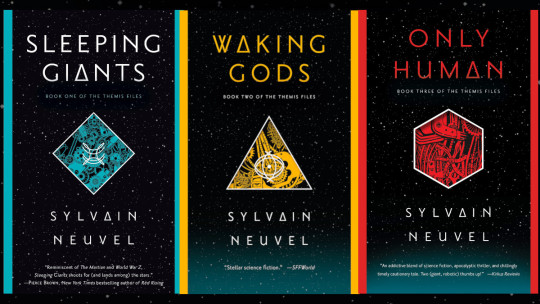
Mystery, Thriller, Fantasy, SciFi, each book is around 300 pages
A girl named Rose is riding her new bike near her home in Deadwood, South Dakota, when she falls through the earth. She wakes up at the bottom of a square-shaped hole, its walls glowing with intricate carvings. But the firemen who come to save her peer down upon something even stranger: a little girl in the palm of a giant metal hand. Seventeen years later, the mystery of the bizarre artifact remains unsolved - the object's origins, architects, and purpose unknown. Carbon dating defies belief; military reports are redacted; theories are floated, then rejected. But some can never stop searching for answers. Rose Franklin is now a highly trained physicist leading a top-secret team to crack the hand's code. And along with her colleagues, she is being interviewed by a nameless interrogator whose power and purview are as enigmatic as the relic they seek. What's clear is that Rose and her compatriots are on the edge of unraveling history's most perplexing discovery, and finally figuring out what it portends for humanity. But once the pieces of the puzzle are in place, will the result be an instrument of lasting peace or a weapon of mass destruction?

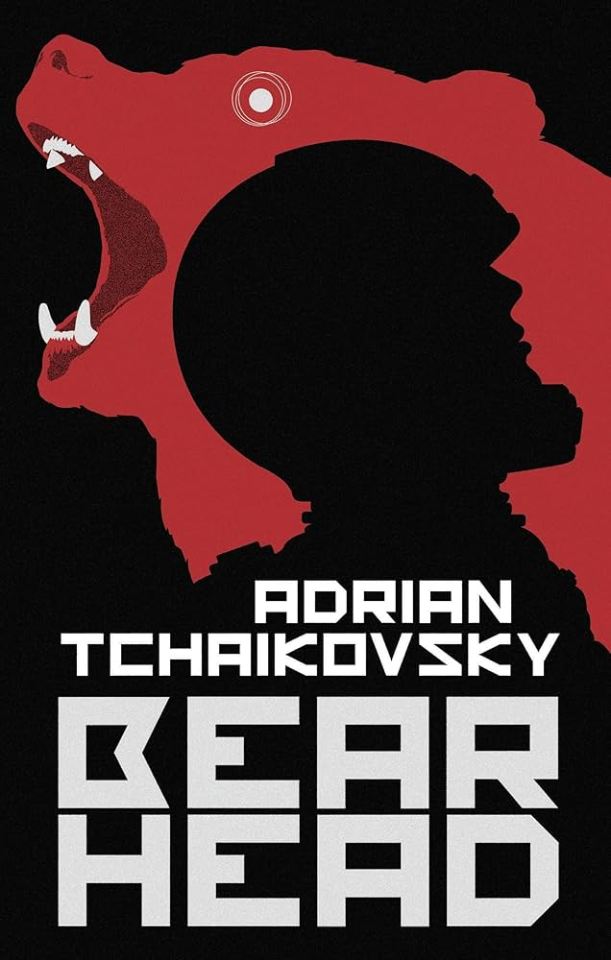
Cyberpunk, War, Dystopia, Fantasy, SciFi, books are 300-350 pages
My name is Rex. I am a good dog. Rex is also seven foot tall at the shoulder, bulletproof, bristling with heavy calibre weaponry and his voice resonates with subsonics especially designed to instil fear. With Dragon, Honey and Bees, he's part of a Multiform Assault Pack operating in the lawless anarchy of Campeche, south-eastern Mexico. Rex is a genetically engineered Bioform, a deadly weapon in a dirty war. He has the intelligence to carry out his orders and feedback implants to reward him when he does. All he wants to be is a Good Dog. And to do that he must do exactly what Master says and Master says he's got to kill a lot of enemies. But who, exactly, are the enemies? What happens when Master is tried as a war criminal? What rights does the Geneva Convention grant weapons? Do Rex and his fellow Bioforms even have a right to exist? And what happens when Rex slips his leash?
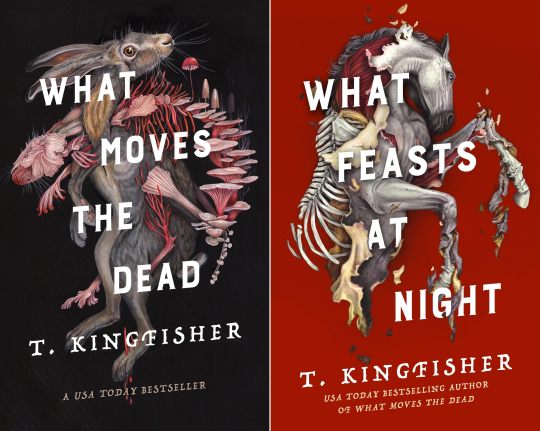
Horror, Fantasy, Gothic, Mystery, both books are around 140 pages
When Alex Easton, a retired soldier, receives word that their childhood friend Madeline Usher is dying, they race to the ancestral home of the Ushers in the remote countryside of Ruravia. What they find there is a nightmare of fungal growths and possessed wildlife, surrounding a dark, pulsing lake. Madeline sleepwalks and speaks in strange voices at night, and her brother Roderick is consumed with a mysterious malady of the nerves. Aided by a redoubtable British mycologist and a baffled American doctor, Alex must unravel the secret of the House of Usher before it consumes them all.
seen this get recommended to annihilation fans are bunch...

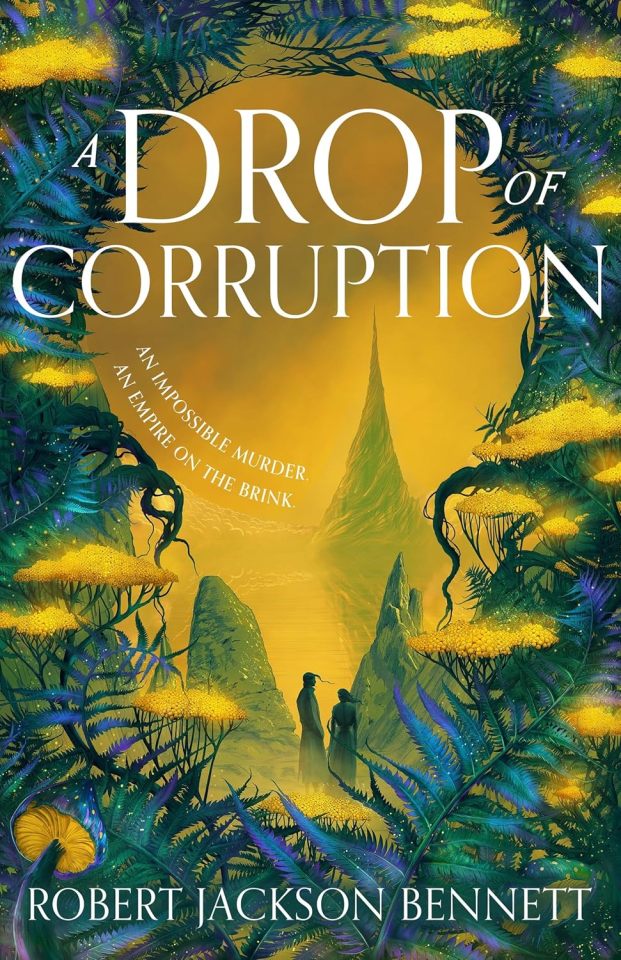
Mystery, Thriller, Crime, Fantasy, SciFi, Queer, first book is 450 pages, second book isn't out yet
In Daretana’s most opulent mansion, a high Imperial officer lies dead—killed, to all appearances, when a tree spontaneously erupted from his body. Even in this canton at the borders of the Empire, where contagions abound and the blood of the Leviathans works strange magical changes, it’s a death at once terrifying and impossible. Called in to investigate this mystery is Ana Dolabra, an investigator whose reputation for brilliance is matched only by her eccentricities. At her side is her new assistant, Dinios Kol. Din is an engraver, magically altered to possess a perfect memory. His job is to observe and report, and act as his superior’s eyes and ears--quite literally, in this case, as among Ana’s quirks are her insistence on wearing a blindfold at all times, and her refusal to step outside the walls of her home. Din is most perplexed by Ana’s ravenous appetite for information and her mind’s frenzied leaps—not to mention her cheerful disregard for propriety and the apparent joy she takes in scandalizing her young counterpart. Yet as the case unfolds and Ana makes one startling deduction after the next, he finds it hard to deny that she is, indeed, the Empire’s greatest detective. As the two close in on a mastermind and uncover a scheme that threatens the safety of the Empire itself, Din realizes he’s barely begun to assemble the puzzle that is Ana Dolabra—and wonders how long he’ll be able to keep his own secrets safe from her piercing intellect. Featuring an unforgettable Holmes-and-Watson style pairing, a gloriously labyrinthine plot, and a haunting and wholly original fantasy world, The Tainted Cup brilliantly reinvents the classic mystery tale.
ive got NO idea why this has the queer tag on goodreads but if these 2 holmes and watson likes end up being faggots together i am HERE i need to be HERE
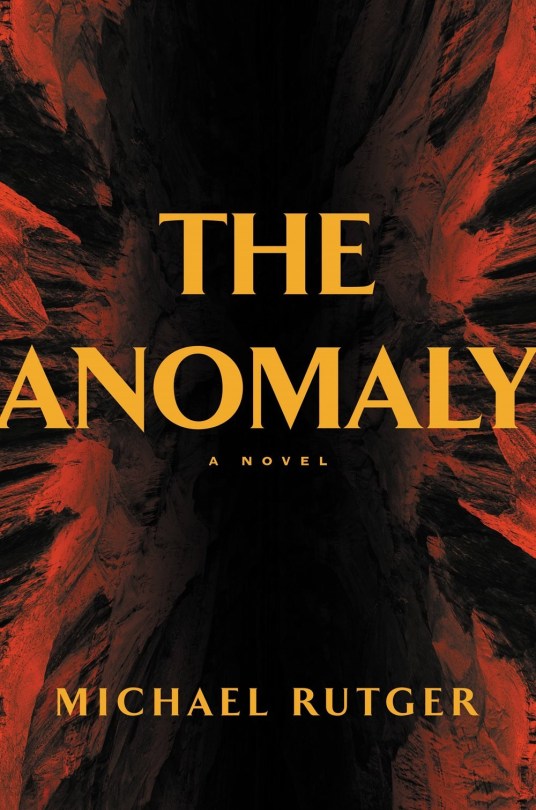
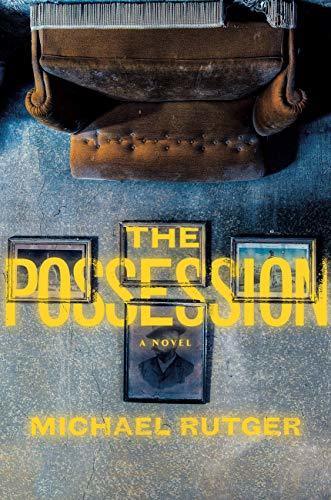
Horror, Mystery, Thriller, Adventure, Paranormal, Fantasy, SciFi, books are 350-400 pages long
Not all secrets are meant to be found. If Indiana Jones lived in the X-Files era, he might bear at least a passing resemblance to Nolan Moore -- a rogue archaeologist hosting a documentary series derisively dismissed by the "real" experts, but beloved of conspiracy theorists. Nolan sets out to retrace the steps of an explorer from 1909 who claimed to have discovered a mysterious cavern high up in the ancient rock of the Grand Canyon. And, for once, he may have actually found what he seeks. Then the trip takes a nasty turn, and the cave begins turning against them in mysterious ways. Nolan's story becomes one of survival against seemingly impossible odds. The only way out is to answer a series of intriguing questions: What is this strange cave? How has it remained hidden for so long? And what secret does it conceal that made its last visitors attempt to seal it forever?
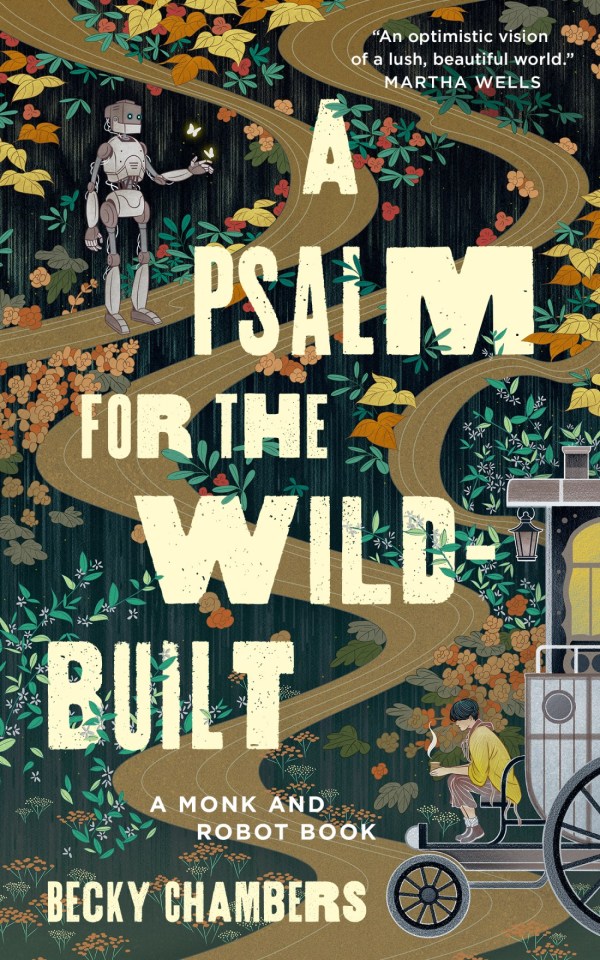

Cosy Mystery, Fantasy, SciFi, LGBT, both books are around 120 pages
Centuries before, robots of Panga gained self-awareness, laid down their tools, wandered, en masse into the wilderness, never to be seen again. They faded into myth and urban legend.Now the life of the tea monk who tells this story is upended by the arrival of a robot, there to honor the old promise of checking in. The robot cannot go back until the question of "what do people need?" is answered. But the answer to that question depends on who you ask, and how. They will need to ask it a lot. Chambers' series asks: in a world where people have what they want, does having more matter?
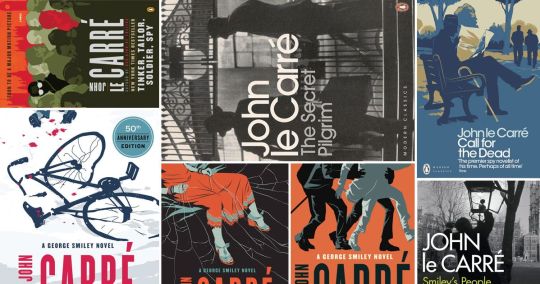
Mystery, Thriller, Crime, Espionage, Spy, books average to around 300 pages but there's.. a lot of books..... i have 9 books and 1 novella in this series
John le Carré classic novels deftly navigate readers through the intricate shadow worlds of international espionage with unsurpassed skill and knowledge, and have earned him -- and his hero, British Secret Service Agent George Smiley, who is introduced in this, his first novel -- unprecedented worldwide acclaim. George Smiley had liked Samuel Fennan, and now Fennan was dead from an apparent suicide. But why? Fennan, a Foreign Office man, had been under investigation for alleged Communist Party activities, but Smiley had made it clear that the investigation -- little more than a routine security check -- was over and that the file on Fennan could be closed. The very next day, Fennan was found dead with a note by his body saying his career was finished and he couldn't go on. Smiley was puzzled...
jeff vandermeer said le carré's work inspired authority which is my favourite book of all time . so. i'm interested
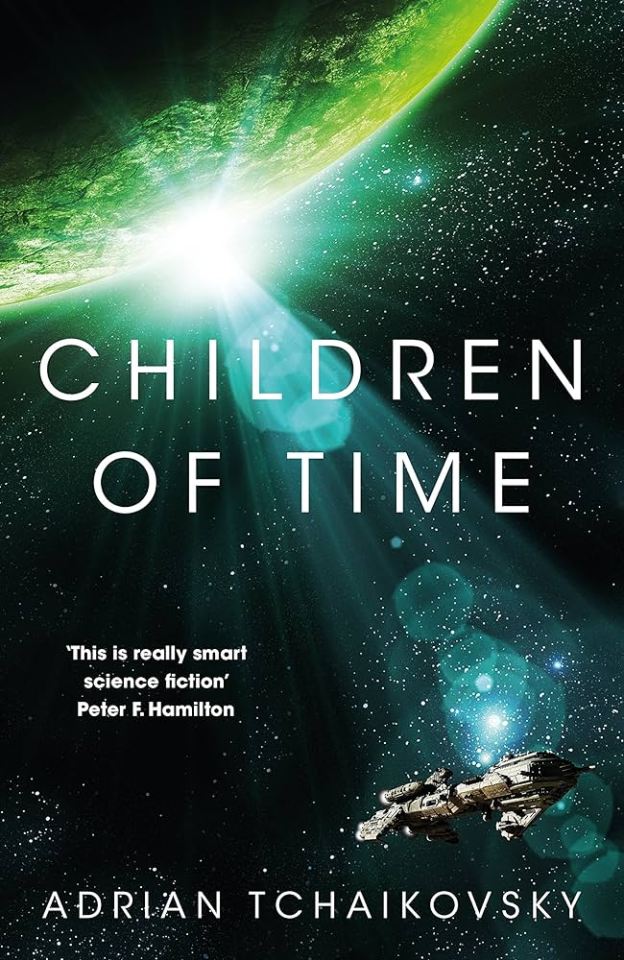
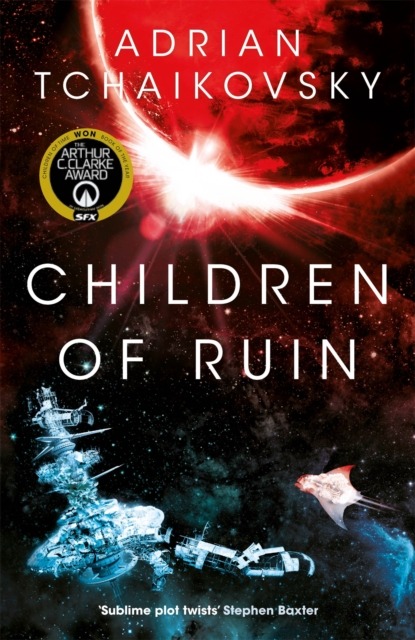
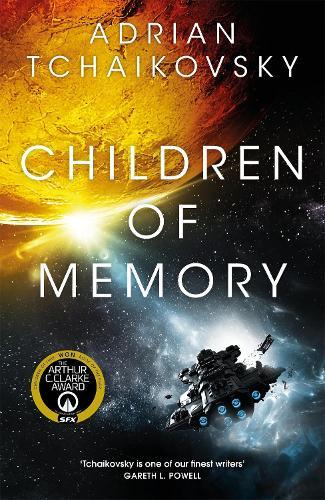
Post Apocalpytic, Dystopia, Space Opera, Fantasy, SciFi, books are 400-600 pages
A race for survival among the stars... Humanity's last survivors escaped earth's ruins to find a new home. But when they find it, can their desperation overcome its dangers? WHO WILL INHERIT THIS NEW EARTH? The last remnants of the human race left a dying Earth, desperate to find a new home among the stars. Following in the footsteps of their ancestors, they discover the greatest treasure of the past age—a world terraformed and prepared for human life. But all is not right in this new Eden. In the long years since the planet was abandoned, the work of its architects has borne disastrous fruit. The planet is not waiting for them, pristine and unoccupied. New masters have turned it from a refuge into mankind's worst nightmare. Now two civilizations are on a collision course, both testing the boundaries of what they will do to survive. As the fate of humanity hangs in the balance, who are the true heirs of this new Earth?
ive been told theres evolved jumping spiders in this and like. im here for that. my god am i here for that



Weird Fiction, Post Apocalyptic, Dystopia, Fantasy, SciFi, books are 200-300 pages
In a ruined, nameless city of the future, a woman named Rachel, who makes her living as a scavenger, finds a creature she names “Borne” entangled in the fur of Mord, a gigantic, despotic bear. Mord once prowled the corridors of the biotech organization known as the Company, which lies at the outskirts of the city, until he was experimented on, grew large, learned to fly and broke free. Driven insane by his torture at the Company, Mord terrorizes the city even as he provides sustenance for scavengers like Rachel.
jeff vandermeeeerrr..... also i love how he has a book called strange bird and a character called ghost bird in southern reach....



Weird Fiction, New Weird, Horror, Steampunk, Speculative Fiction, Fantasy, SciFi, the omnibus is 1.5k pages long
Before Area X, there was Ambergris. Jeff VanderMeer conceived what would become his first cult classic series of speculative works: the Ambergris Trilogy. Now, for the first time ever, the story of the sprawling metropolis of Ambergris is collected into a single volume, including City of Saints and Madmen, Shriek: An Afterword, and Finch. In City of Saints and Madmen, Jeff VanderMeer has reinvented the literature of the fantastic. You hold in your hands an invitation to a place unlike any you’ve ever visited–an invitation delivered by one of our most audacious and astonishing literary magicians. City of elegance and squalor. Of religious fervor and wanton lusts. And everywhere, on the walls of courtyards and churches, an incandescent fungus of mysterious and ominous origin. In Ambergris, a would-be suitor discovers that a sunlit street can become a killing ground in the blink of an eye. An artist receives an invitation to a beheading–and finds himself enchanted. And a patient in a mental institution is convinced he’s made up a city called Ambergris, imagined its every last detail, and that he’s really from a place called Chicago.… By turns sensuous and terrifying, filled with exotica and eroticism, this interwoven collection of stories, histories, and “eyewitness” reports invokes a universe within a puzzlebox where you can lose–and find–yourself again.
54 notes
·
View notes
Text
Hypothetical AI election disinformation risks vs real AI harms
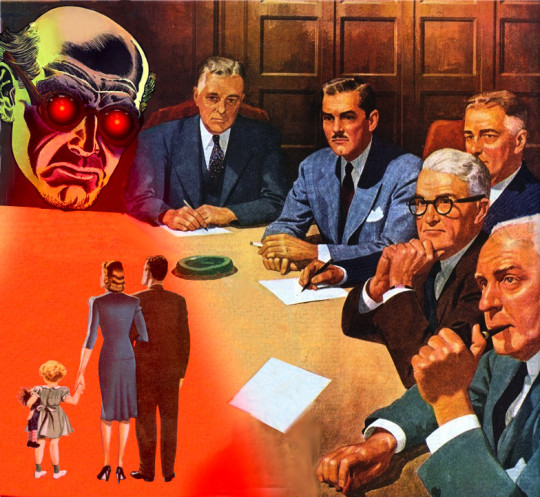
I'm on tour with my new novel The Bezzle! Catch me TONIGHT (Feb 27) in Portland at Powell's. Then, onto Phoenix (Changing Hands, Feb 29), Tucson (Mar 9-12), and more!

You can barely turn around these days without encountering a think-piece warning of the impending risk of AI disinformation in the coming elections. But a recent episode of This Machine Kills podcast reminds us that these are hypothetical risks, and there is no shortage of real AI harms:
https://soundcloud.com/thismachinekillspod/311-selling-pickaxes-for-the-ai-gold-rush
The algorithmic decision-making systems that increasingly run the back-ends to our lives are really, truly very bad at doing their jobs, and worse, these systems constitute a form of "empiricism-washing": if the computer says it's true, it must be true. There's no such thing as racist math, you SJW snowflake!
https://slate.com/news-and-politics/2019/02/aoc-algorithms-racist-bias.html
Nearly 1,000 British postmasters were wrongly convicted of fraud by Horizon, the faulty AI fraud-hunting system that Fujitsu provided to the Royal Mail. They had their lives ruined by this faulty AI, many went to prison, and at least four of the AI's victims killed themselves:
https://en.wikipedia.org/wiki/British_Post_Office_scandal
Tenants across America have seen their rents skyrocket thanks to Realpage's landlord price-fixing algorithm, which deployed the time-honored defense: "It's not a crime if we commit it with an app":
https://www.propublica.org/article/doj-backs-tenants-price-fixing-case-big-landlords-real-estate-tech
Housing, you'll recall, is pretty foundational in the human hierarchy of needs. Losing your home – or being forced to choose between paying rent or buying groceries or gas for your car or clothes for your kid – is a non-hypothetical, widespread, urgent problem that can be traced straight to AI.
Then there's predictive policing: cities across America and the world have bought systems that purport to tell the cops where to look for crime. Of course, these systems are trained on policing data from forces that are seeking to correct racial bias in their practices by using an algorithm to create "fairness." You feed this algorithm a data-set of where the police had detected crime in previous years, and it predicts where you'll find crime in the years to come.
But you only find crime where you look for it. If the cops only ever stop-and-frisk Black and brown kids, or pull over Black and brown drivers, then every knife, baggie or gun they find in someone's trunk or pockets will be found in a Black or brown person's trunk or pocket. A predictive policing algorithm will naively ingest this data and confidently assert that future crimes can be foiled by looking for more Black and brown people and searching them and pulling them over.
Obviously, this is bad for Black and brown people in low-income neighborhoods, whose baseline risk of an encounter with a cop turning violent or even lethal. But it's also bad for affluent people in affluent neighborhoods – because they are underpoliced as a result of these algorithmic biases. For example, domestic abuse that occurs in full detached single-family homes is systematically underrepresented in crime data, because the majority of domestic abuse calls originate with neighbors who can hear the abuse take place through a shared wall.
But the majority of algorithmic harms are inflicted on poor, racialized and/or working class people. Even if you escape a predictive policing algorithm, a facial recognition algorithm may wrongly accuse you of a crime, and even if you were far away from the site of the crime, the cops will still arrest you, because computers don't lie:
https://www.cbsnews.com/sacramento/news/texas-macys-sunglass-hut-facial-recognition-software-wrongful-arrest-sacramento-alibi/
Trying to get a low-waged service job? Be prepared for endless, nonsensical AI "personality tests" that make Scientology look like NASA:
https://futurism.com/mandatory-ai-hiring-tests
Service workers' schedules are at the mercy of shift-allocation algorithms that assign them hours that ensure that they fall just short of qualifying for health and other benefits. These algorithms push workers into "clopening" – where you close the store after midnight and then open it again the next morning before 5AM. And if you try to unionize, another algorithm – that spies on you and your fellow workers' social media activity – targets you for reprisals and your store for closure.
If you're driving an Amazon delivery van, algorithm watches your eyeballs and tells your boss that you're a bad driver if it doesn't like what it sees. If you're working in an Amazon warehouse, an algorithm decides if you've taken too many pee-breaks and automatically dings you:
https://pluralistic.net/2022/04/17/revenge-of-the-chickenized-reverse-centaurs/
If this disgusts you and you're hoping to use your ballot to elect lawmakers who will take up your cause, an algorithm stands in your way again. "AI" tools for purging voter rolls are especially harmful to racialized people – for example, they assume that two "Juan Gomez"es with a shared birthday in two different states must be the same person and remove one or both from the voter rolls:
https://www.cbsnews.com/news/eligible-voters-swept-up-conservative-activists-purge-voter-rolls/
Hoping to get a solid education, the sort that will keep you out of AI-supervised, precarious, low-waged work? Sorry, kiddo: the ed-tech system is riddled with algorithms. There's the grifty "remote invigilation" industry that watches you take tests via webcam and accuses you of cheating if your facial expressions fail its high-tech phrenology standards:
https://pluralistic.net/2022/02/16/unauthorized-paper/#cheating-anticheat
All of these are non-hypothetical, real risks from AI. The AI industry has proven itself incredibly adept at deflecting interest from real harms to hypothetical ones, like the "risk" that the spicy autocomplete will become conscious and take over the world in order to convert us all to paperclips:
https://pluralistic.net/2023/11/27/10-types-of-people/#taking-up-a-lot-of-space
Whenever you hear AI bosses talking about how seriously they're taking a hypothetical risk, that's the moment when you should check in on whether they're doing anything about all these longstanding, real risks. And even as AI bosses promise to fight hypothetical election disinformation, they continue to downplay or ignore the non-hypothetical, here-and-now harms of AI.
There's something unseemly – and even perverse – about worrying so much about AI and election disinformation. It plays into the narrative that kicked off in earnest in 2016, that the reason the electorate votes for manifestly unqualified candidates who run on a platform of bald-faced lies is that they are gullible and easily led astray.
But there's another explanation: the reason people accept conspiratorial accounts of how our institutions are run is because the institutions that are supposed to be defending us are corrupt and captured by actual conspiracies:
https://memex.craphound.com/2019/09/21/republic-of-lies-the-rise-of-conspiratorial-thinking-and-the-actual-conspiracies-that-fuel-it/
The party line on conspiratorial accounts is that these institutions are good, actually. Think of the rebuttal offered to anti-vaxxers who claimed that pharma giants were run by murderous sociopath billionaires who were in league with their regulators to kill us for a buck: "no, I think you'll find pharma companies are great and superbly regulated":
https://pluralistic.net/2023/09/05/not-that-naomi/#if-the-naomi-be-klein-youre-doing-just-fine
Institutions are profoundly important to a high-tech society. No one is capable of assessing all the life-or-death choices we make every day, from whether to trust the firmware in your car's anti-lock brakes, the alloys used in the structural members of your home, or the food-safety standards for the meal you're about to eat. We must rely on well-regulated experts to make these calls for us, and when the institutions fail us, we are thrown into a state of epistemological chaos. We must make decisions about whether to trust these technological systems, but we can't make informed choices because the one thing we're sure of is that our institutions aren't trustworthy.
Ironically, the long list of AI harms that we live with every day are the most important contributor to disinformation campaigns. It's these harms that provide the evidence for belief in conspiratorial accounts of the world, because each one is proof that the system can't be trusted. The election disinformation discourse focuses on the lies told – and not why those lies are credible.
That's because the subtext of election disinformation concerns is usually that the electorate is credulous, fools waiting to be suckered in. By refusing to contemplate the institutional failures that sit upstream of conspiracism, we can smugly locate the blame with the peddlers of lies and assume the mantle of paternalistic protectors of the easily gulled electorate.
But the group of people who are demonstrably being tricked by AI is the people who buy the horrifically flawed AI-based algorithmic systems and put them into use despite their manifest failures.
As I've written many times, "we're nowhere near a place where bots can steal your job, but we're certainly at the point where your boss can be suckered into firing you and replacing you with a bot that fails at doing your job"
https://pluralistic.net/2024/01/15/passive-income-brainworms/#four-hour-work-week
The most visible victims of AI disinformation are the people who are putting AI in charge of the life-chances of millions of the rest of us. Tackle that AI disinformation and its harms, and we'll make conspiratorial claims about our institutions being corrupt far less credible.

If you'd like an essay-formatted version of this post to read or share, here's a link to it on pluralistic.net, my surveillance-free, ad-free, tracker-free blog:
https://pluralistic.net/2024/02/27/ai-conspiracies/#epistemological-collapse

Image: Cryteria (modified) https://commons.wikimedia.org/wiki/File:HAL9000.svg
CC BY 3.0 https://creativecommons.org/licenses/by/3.0/deed.en
#pluralistic#ai#disinformation#algorithmic bias#elections#election disinformation#conspiratorialism#paternalism#this machine kills#Horizon#the rents too damned high#weaponized shelter#predictive policing#fr#facial recognition#labor#union busting#union avoidance#standardized testing#hiring#employment#remote invigilation
146 notes
·
View notes
Text
Listen, this is a pretty hopeless vent below. i am rational and know things are going to keep working and laws are getting drafted, but a vent is a vent.
And I felt pretty hopeless.
Don't you feel terrified that even to your best abilities, AI can generate something arguably better, economically viable? Doesn't it make shivers down to your bones knowing your 20 or so years of efforts are now worth pennies, and the future you planned os now only the next 5 years until it's fully trained?
Doesn't it scare you that people who pay to use it are paying to have the privilege to train it and soon enough they too will be replaced? That artistry is one of the most ancient works, a millenary job, the expression of human existence, and it's now commodified with the blood and sweat of every artist that existed before? That those artists, the dead and alive ones, never ever and never would agree with their work being used like this? And that there's people who rejoice on the misery they feel?
That the joy of seeing a new art is dead because you have to make sure you're supporting a real person? That the smile is replaced with a double take, a zoom in on the features?
The complete destruction of the search engines that both show and spit out nonsense, for the untrained eye to be unable to know the reality they love in, as well of the past they'll never get to fully understand, because a machine who knows nothing generated some Greek art? Indigenous? Fake animals? Fake political mishaps?
Doesn't it make you cry that you'll never have money to throw at the problem because your enemy has more money alone than all of the 99% living humans on this earth at this moment? That they're happy never to ever hire an artist again? A voice actor? A designer?
That my dream was once to sell my art on DeviantArt and recently they congratulated the biggest seller they had, who's now an AI generator that makes ladies with big boobs.
That other people who don't know my grief tell me to "adapt" and "use it too" so I won't be forgotten?
To make me wonder how people once made the most beautiful lace by hand and now it's worth less than what I breathe and that's now my future?
That once art brought me joy and now it makes me wonder for how long can I keep doing it?
#its extremely negative#yo see friends and family share that stuff and they dont know#the fake facebook ads#the scammy “share my art” posts that are just content farms#the misery of everyone around me#it's everywhere#its on this fucking samsumg tab#its on thos fuckin phone#i uses my art and charges me for it#nothing i say is mine now
30 notes
·
View notes
Text
I found out today that my workplace is now asking interview candidates how they feel about AI. My work has become an absolute staunch supporter of generative AI lately and is pressuring everyone to incorporate it into their daily work. Chatting with a few workmates, I am baffled that I'm the only one who seems to have any reservations about this. (I talked with my manager today and he wasn't even aware of all the ethical issues with it! Shocker!)
I want to clarify that I'm not categorically against all AI. I majored in compsci and I did my masters on machine learning. But the things I wanted to build with this skill set are things like anomaly detection and pattern recognition. I get excited about tools like spam filters and accurate search engines. There's a place for generative AI, like with GANs, but I believe that the way it's being wielded now by the industry is just soul-sucking.
My company has heavily hinted that there's no future for anyone there who isn't willing to jump on the genAI bandwagon; rather shocking as it was up until that point, the most employee-friendly company I've worked at so far. I'd hate to lose the comprehensive health benefits it provides at a time I'm dealing with a chronic illness. And even if I did leave, the darlings of the Toronto tech scene had made it clear genAI is their future -- everyone else is going to be copying them. I don't think there's any job that's safe from the AI infiltration.
So I want to ask you guys. If you're at a company that's now forcing you to use genAI, how are you using it in a way that still lets you sleep at night?
13 notes
·
View notes
Text
Glamrock Freddy Through The Ball-pit AU
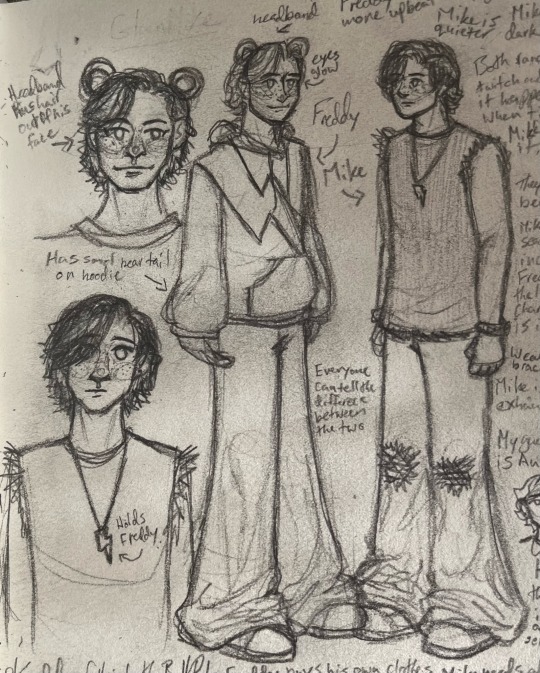
It’s a twist on GlamMike, time-travel fix-it, cc lives blah blah so on and so forth. It’s long so it’s under the cut :)
At some point after Security Breach (the Vanny ending where he gets disassembled) Glamrock Freddy falls into a decommissioned ball-pit an a storage room. His AI is tuned into a light blue lightning bolt charm and lands on the other side.
About a week before the cc(Evan)’s bday party, Michael(13) is in the ball pit and finds the Freddy AI charm. He sticks it on a string and wears it cuz he thinks it looks cool.
Freddy in the charm works sort of like a ghost and Mike starts hearing random whispers of Freddy throughout the week leading up to the party. Over that week, Freddy is working on where he is and how he can communicate with Michael.
Freddy has been catching glimpses of the outside world through Mike’s eyes through the week, but never tried to take control until Evan’s head was about to be shoved into Fredbear’s mouth. Recognizing the danger, Freddy shoves his way to the front and takes control of Mike’s body.
Freddy stays in control until that night, keeping an eye on Evan(7). Mike freaks out when he finally has control back and locks himself in his room to figure out what the heck happened to him. Mike and Freddy talk a lot over about a week in self imposed isolation.
The events of FNAF 4 (Evan’s nightmares) happen the week after the prevented Bite of ‘83 while Mike had locked himself in his room. It’s actually his terrified screaming that draws Mike/Freddy out. By then the two have come to a shaky agreement to share control of their body and try (mostly Freddy) to comfort Evan.
With Freddy’s influence, Mike is nicer to his siblings. The kid is influenced a lot by the people he hangs out with, becoming a bully with his bully friends (who don’t talk to him much after “he chickened out”), then being kinder with Freddy in copilot seat.
Evan is around them the most, ever since they helped him with his nightmares. He can easily tell the difference between Michael and Freddy. Freddy is more upbeat and wears brighter colors, while Mike is quieter and prefers darker colors.
Freddy doesn’t really know much about the history of Fazbear Entertainment so he’s not much help with any future perspective. Mike(Freddy) can occasionally be heard humming or singing songs that haven’t come out yet though.
Charlie Emily(11) is killed a couple months after the foiled bite, locked out of her own birthday party. She goes on to inhabit the puppet.
Elizabeth dies about a year later at Circus Baby’s at 9 years old. She haunts Baby.
Over the next year, William kills five kids and stuffs them in the suits, his Remnant research underway.
When Mike turns 16, they take a now 10 year old Evan and run. William had been distant ever since Elizabeth “disappeared” and Freddy is suspicious. It isn’t hard to convince Michael that he could take better care of the brothers away from the Afton house. They hole up in an empty house on the outskirts of Hurricane, ruling out Henry Emily on the basis that William would look there first if he went searching for them.
Freddy takes driver seat a lot of the time, getting Mike a job at the nearest grocery store. He also helps Mike homeschool Evan.
Mike gets his first Freddy job at 17 in ‘87(fnaf 2). There he meets Jeremy Fitzgerald(19) who is working day shift and needs a place to stay. Freddy thoroughly vets him before they offer him a room at their house.
Freddy tells Jeremy to be careful around the animatronics. Jeremy is still bit, but it’s his shoulder and he promptly resigns, picking up a different job as a pizza delivery boy to pay for the motorcycle he wants.
When the pizzeria closes, not long after the bite, Mike starts searching for William while going back to the grocery store.
When Mike is 24 (‘94), he sneaks back into the Afton house and finds suspicious notes about the Sister Location. He gets a job there.
Freddy is unable to stop them from being scooped, but due to being fused with his AI for so long, Mike isn’t as affected by Ennard. He’s still missing some organs, he’ll never age past 24, and there’s no way he’ll be eating ever again; but he doesn’t decay and is able to eventually heal, it just takes more time than is normal. He’s covered in bandages for almost a whole year after that incident.
A few years later (‘96) Evan takes the night shift at Freddy’s Pizzeria (fnaf 1), and later (‘97) Mike takes one at Fazbear Frights (fnaf 3).
Mike does take the job at the Pizzeria Simulator (fnaf 6) which I’m setting closer to the early 2000s (‘04 maybe?). He takes the exit route Henry has left open and returns to Evan and Jeremy with Helpy in tow.
Security Breach is set closer to 2010-15. Freddy isn’t sure how he feels seeing his former self on stage again, especially as he’s explained to Mike that they need to find Gregory before Vanny does. Mike is pissed the pizzeria fire didn’t end William like they thought it did.
Gregory goes through the night with them and the animatronic Freddy, going home with them while the Pizza Plex burns down.
Other random notes:
Freddy pushes their hair out of their face, often pinning it back, while Mike tends to let it flop in their face. Freddy has been known to pull it into two little ponytails and call them his bear ears

Mike already had his ears pierced, but Freddy got one more to match the one he had as an animatronic.
Mike is nearsighted and needs glasses, but Freddy doesn’t so Mike refuses to get glasses, instead having Freddy read anything far away if he needs to.
Mike’s eyes are blue-grey, when Freddy is driving his eyes turn an electric blue. The glow in the dark slightly.
The Freddy’s charm glows blue very faintly when he’s talking to Mike when not in control.
They randomly twitch and stutter, due to one of them being a robot. Mike tries to hide or suppress it most of the time, but Freddy doesn’t bother with hiding it.
Mike chews gum almost constantly, to distract from the fact he can’t eat, and so he doesn’t chew on their nails (painted electric blue and black).
All the Aftons are neurodivergent. Evan’s autistic, Elizabeth had ADHD, and Michael is AuDHD. Haven’t decided on William yet but he ain’t neurotypical.
Mike has a different mother than his younger two siblings, and he’s half Mexican. His mom is never mentioned (she didn’t die, just left after Mike was born cuz she didn’t want kids) and Ballora is made for William’s second wife, Clara.
Mike is 5’9”, Evan ends up being 6’0”, and Jeremy is 5’11”.
Mike doesn’t physically or mentally age after being scooped, but it takes them a while to figure that out since Freddy’s never aged in the first place.
Evan has glasses.
Mike always refuses to wear the black pants that comes with the security guard outfit, instead wearing his trademark hole-y jeans.
While they both dislike being shorter than Evan, Mike sees it as one thing he doesn’t have in common with William. Freddy just sees it as a hindrance in reaching the top shelf.
Jeremy is a gay trans dude, and has a mullet and dyslexia.
Mike is queer ace. Freddy’s doesn’t particularly care about any of that(being an AI), and they use He/Him and They/Them pronouns because they’re two guys in one body. They also tend to refer to themselves as ‘we’.
Evan’s aroace. He’d much rather figure out the secrets behind his father’s robots.
That’s the scoop!
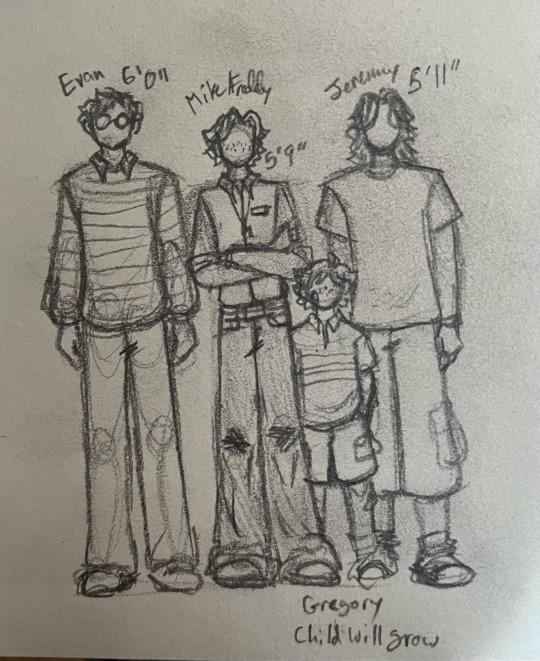
#fnaf#michael afton#mike schmidt#jeremy fitzgerald#evan afton#the crying child#elizabeth afton#william afton#charlie emily#henry emily#glamrock freddy#glammike#glammike au#time travel au#fnaf gregory#fnaf vanny#fnaf security breach#fnaf sb#hints of:#jeremike#cuz I’m gay and I say so#helpy fnaf#my art#eggs benedict#eggs benedict fnaf#Glamrock Freddy through the ball pit au#gfttbp au#FazMike au
111 notes
·
View notes
Text
The ethics of AI and their accessibility.
I use AI for accessibility reasons. "BUT FAE! AI IS BIG AND BAD AND AND AND"
Listen. I'm literally a computer person. It's in my job description. I know the good and the bad and the ugly.
The good
As mentioned, I use it for accessibility reasons. Tone doesn't come across in written form, and I have a very hard time sounding as passionate as I do in person. Sometimes I gotta write something for LinkedIn and be like "Okay but make it sound like I actually care.
Sometimes I gotta clean my bathroom but the task makes me want to hyperventilate, and there's tools that help you break it into manageable tasks.
Sometimes I just won't eat because the process of finding something to make is TOO MUCH WORK and there's tools that'll let you enter what you have and you can even enter something like "make it 700 calories and a one pot meal because I'm trying to not lose weight but I don't got the spoons to clean all the shit." AND YOU KNOW IT'S SO HELPFUL IF THE ALTERNATIVE IS NOT EATING.
The bad
"BUT THE AI STEALING FROM AUTHORS ABS ARTISTS AND STEALING JOBS AND MAKING FORAGING BOOKS THAT ARE KILLING PEOPLE"
Yeah. AI isn't great. It's nice when it makes things that were previously very very hard suddenly accessible to you. But of course big companies use it for a cash grab. (Also individuals that would rather not pay actual authors and artists).
That doesn't even get into his AI is taking over entry level positions which in the future could create impossible barriers for people to break into jobs because they can't get the tedious work that's supposed to give them experience because it's being taken over by AI
But let me state. This implementation of AI is not the same as the previous one. Previous one is taking things you need to do like cleaning or cooking and making it accessible to people that would have been previously overwhelmed by it. This one is... not even adding new value into society because it's stealing people's existing value.
The Ugly
THE AI SERVERS ARE KILLING OUR PLANET
Yes they are, but that's not the entire story. Why are he AI servers looking the planet?
1) A lot of the energy spent and the heat produced is entirely on training models. Literally most of it is training the AI, but that doesn't in of itself mean you using it is bad
2) the biggest users of AI are engines like Google trying to figure out who you are so it can alter your search results. Companies like Facebook using the data you give it to generate targeted ads. Also shit like the 2024 election cycle where Twitter pushed targeted contradictory content about Kamala's influence on Gaza to two different groups based on their political beliefs. Not to mention the training it takes to create better and better AI content.
TLDR
AI isn't great. A lot of the AI power used is not surprisingly being used to train AI to make it seem more natural. I 100% DO NOT SUPPORT the use of AI to take over jobs that you should be paying an expert for.
But if you're using a small AI bot (not ChatGPT) to help you in tasks that you previously couldn't complete? It's a huge accessibility tool. I prefer to use tools made by small time developers. It's not PERFECT. Because it doesn't waste a shitton of energy making is writing sound super human and natural, but if you're using it as an ACCESSIBILITY TOOL. Then it's great.
-fae
12 notes
·
View notes
Text

Embassytown, by China Miéville - 4/5
I don't think I've ever been more conflicted about a book in my life. Torn between 3 or 4 stars, but I’ll leave it at 4 while I huff my copium. I could sum up this whole review with a GIF of someone crossing their arms and saying “I’m not mad, I’m just disappointed”. This is not a bad book, it just could have been so much better. It didn’t live up to its full potential because the plot doesn’t do justice to the world building, and that is why I am sentencing you to garbage duty for the rest of the week, son.
Good thing the world building is strong enough to carry most of the read. The first hundred or so pages were honestly the best part of the whole book. Our first person narrator, Avice Bennet Cho, introduces us to the sociology and politics of Embassytown (a human colony state on an alien planet) through a tapestry of past and present narratives. We get to hear Avice describe memories of her childhood growing up in Embassytown, and about her career as an Immerser (basically someone who can navigate through the pocket dimensions of space without getting sick). Through this we also get to learn about the strange ways and language of the Ariekei aliens who are native to the planet, and about their symbiotic relationship with the humans in which they trade medicine and other goods for Ariekene bioengineering (yes, there are weapons, buildings and machinery made out of sentient flesh, it’s awesome). We also get to learn about Avice herself, who honestly begins as a fairly compelling protaganist. Miéville subverts a lot of tropes in building her character without ever being showy about how “different” she is. In fact, most of the characters read as very normal, regular people, and I appreciate that level of detail to human behaviour. He even did a great job at writing one of the AI characters, Avice’s best friend Erhsul, who can imitate human empathy well enough to form real relationships while remaining frustratingly calculative and mechanical.
Arieka is genuinely the most interesting and well thought out alien world I’ve ever read about, and the book has such a clever narrative hook centred around the evolution of language being both devastatingly dangerous but also liberating and ultimately progressive. So why am I so conflicted?
Well, the main plot hinge is sudden and underwhelming (I think it’s meant to be a “small rock, big ripple” type of event but it’s not done very convincingly), and then the entire story from there on switches gears in a way that feels so counterintuitive to the setup. Things in the world begin rapidly changing, and the dual timelines coalesce into one present narrative. The scope of the story rapidly expands from interpersonal to factionary, and our once interesting, well developed protagonist gets flattened down to the personality of a news reporter—speeding through a list of current event headlines just to clock out of her shift a few minutes early. Almost 240 pages of “this happened, and then this happened, and then this happened, and then this happened” ad nauseam. It’s like sitting on a train and watching images flicker past. Sure, the landscape is visceral, and the quick pace keeps things engaging enough, but I couldn’t help but feel like the slow set up—the walk to the train, if you will—was where Miéville really shines. If the story would have just maintained a closer focus, and found some subtler avenue for expressing change, this could have easily been a masterpiece.
Fortunately, Miéville’s prose mostly makes up for his clumsy handling of narrative. He might be one of my new favourite writers on a purely sentence to sentence basis. He has a fairly lofty vocabulary, and also throws a ton of future slang at you without holding your hand too much, leaving you to search for context clues (this is actually a good thing that I enjoy), but he is also just a master at manipulating sentence structures to maintain clarity while still coming across as playful. There were so many sentences that I had to read twice or thrice not because I didn’t understand them, but because I was just fascinated by the clever wording. The prose itself was the second best thing after the world building, so even when the plot took a nose dive, I was still turning pages like nobody’s business.
Ultimately, Miéville hit a home run with the set up and then tripped and slid somewhere between second and third base, making for a highly entertaining but clumsy play. The fact that this book never lived up to it’s potential will be a thorn in my side for the rest of time, but I am still absolutely sold on Miéville as a writer, and can’t wait to read more of his works.
#china mieville#embassytown#sci fi#science fiction#sci fi books#genre fiction#literary fiction#books#book review
6 notes
·
View notes
Text
What is word steam?
Word steam is a company that makes "ai generated" audio books. Many of the "audiobooks" on their website are in fact, fanfictions scraped from ao3 and reuploaded without the authors concent.
How do I check if mine has been uploaded?
Go to the website and search your pen name, or your fandom name. I found many popular magnus archives fanfics for example when breifly searching.
*****WEBSITE IS DOWN, FOR NOW.*****
Legally, what next?
Well, OTW legal has been informed of the situation and so far as i can tell, have not responded yet. Equally unfortunately, the creator of the website has responded and...
I will let you all be the judge of these responses:
Reddit:
Hey everybody, the person behind word stream here: I am dyslexic and built word stream to help other students like me who have dyslexia, ADHD, vision challenges, concussions, or anxiety to access fan-fiction, because for us, reading with our eyes can be very challenging and there are no audiobooks for fan fiction typically. Word Stream is free for anyone to use. There is a paid plan for ppl who want to use high quality text to speech which is priced at the minimum amount we can to cover server/gpu costs to power the text to speech. The next iteration will also include free text to speech but with a lower quality bar. I apologize to anyone who saw this and was upset this in no way is our intention. We support all valid take down notices and will always make it right if you reach out to us with the name of your work. [email protected] Please email me if we have a peace of work that is yours you don't want up there and I will take it down immediately [email protected] A future release will also add the ability to tip authors so writers can make money not from selling the works but via tips from grateful readers, the ability for authors to build and communicate with an email list of readers, ability for authors to see retention graphs of where users drop off during reading, and abilities to authors to easily manage their works. We are strong supporters of second language learners (non native speakers of English), and of users who love fan fiction but who have a job that makes their hands/eyes busy but ears free. Once again I apologize for a beta product that got more attention that it had any right to before it was complete and for the clearly tone deaf wording which we are fixing to make sure communication is better about take down notices. Warmly, Cliff
Tumblr: from @cliffweitzman
(in a reply) Hey everybody, the person behind word stream here. Please email me if we have a peace of work that is yours you don't want up there and I will take it down immediately [email protected] I am dyslexic and built word stream to help other students like me who have dyslexia, adhd, low vision, concussions, anxiety, who are second language learners, or who also love listening to fan fiction but have a job that makes their hands/eyes busy but ears free. Word Stream is free for anyone to use. The next iteration will also include free text to speech, we have a paid tier for ppl who want to use high quality text to speech which is priced at the minimum amount we can to cover server/gpu costs to power the text to speech. (in a reply to a reply) I apologize to anyone who saw this and was upset this in no way is our intention. We support all valid take down notices and will always make it right if you reach out to us with the name of your work. [email protected]
In these messages, it says to email "[email protected]" - i would caution anyone from doing this immediately, and perhaps wait for OTW Legal to respond to the situation.
you can ALSO file a takedown, which other people in the word steam tag have explained how to do
as writing this, the website is down because of a dns error. i dont really know what that means.
when/if the website goes back up, i HIGHLY recommend checking to see if your fic has been reuploaded.
14 notes
·
View notes